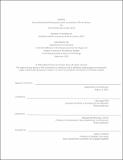Reconciling Social Housing and access to urbanity in Rio de Janeiro
Author(s)
Serra, Olivia Paraiso de Campos
DownloadThesis PDF (14.48Mb)
Advisor
Segal, Rafi
de Monchaux, Nicholas
Terms of use
Metadata
Show full item recordAbstract
This work is a discussion around the potential of "Parcelamento, Edificação ou Utilização Compulsórios" in English: "Compulsory land parceling, building and use" (or CPBU) in the city of Rio de Janeiro. The law exists under the umbrella of the City Statute, a set of laws implemented in Brazil in 2001. It enables municipalities to regulate land use and management towards a more socially inclusive and just environment, acknowledging that the city's social function and the right to the city should be contemplated within the scope of civic rights. CPBU is a way to promote the use of unused and underused land by pressuring the owners of these properties through the increase of property taxation and the eventual seizing of the areas.
Some of the measures proposed by the City Statute were widely accepted and are employed in several cities. The main controversy regarding its application, however, revolves around the fact that in many places, it has been used to benefit public-private partnerships, favoring the market logic and opposing the City Statute's primary goal: to promote land tenure regularization and fight land speculation. This work will deal with the current use of this set of laws juxtaposed to the broader theme of social housing. In this thesis, I argue to overcome this dynamic, limiting the supply and quality of public services and infrastructure. The urban redevelopment of socially unproductive lands by drawing on the CPBU law could render these unused/underused properties profitable for the resident population by focusing on a more accessible and compact city model, for instance.
This work will develop new guidelines for applying CPBU in Rio de Janeiro’s Master Plan in two scales. The first scale will be the development of a framework based on the concept of urban analytics. This framework will hierarchize criteria that outputs a new delineation for CPBU; this will be a static representation of the criteria according to the data inputted. The second scale will be a collection of volumes that are in parcels and blocks within the new CPBU delineation. This interscalar effort will attempt to quantify the potential of CPBU applied for social housing in Rio.
Date issued
2021-09Department
Massachusetts Institute of Technology. Department of ArchitecturePublisher
Massachusetts Institute of Technology